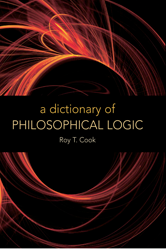Logic
"Logic is the systematic study of valid inference. A distinction is drawn between logical validity and truth. Validity merely refers to formal properties of the process of inference. Thus, a conclusion whose value is true may be drawn from an invalid argument, and one whose value is false, from a valid sequence. For example, the argument All professors are brilliant; Smith is a professor, therefore, Smith is brilliant is a valid inference, but the argument All professors are brilliant; Smith is brilliant; therefore, Smith is a professor is an invalid inference, even if Smith is a professor." (The Columbia Encyclopedia, Credo Reference)
-
Logic: Credo ReferenceA Credo Reference landing page on logic. This page includes reference works, articles, images, library resources, and a concept map.
-
Logic Reading ListA recommended list of books in McKee Library's collection on the topic of logic.
-
Logic JournalsBrowse McKee Library's collection of logic journals.
Research and Reference
-
Logic and Philosophy of Logic: PhilPapersLogic and Philosophy of Logic includes results ranging from such philosophical disciplines as logical philosophy and philosophy of logic to mathematical logic, a subfield of mathematics exploring the applications of formal logic to mathematics. Philosophy of logic is devoted to the investigation, analysis and reflection on issues arising in logic, while philosophical logic concerns questions about reference, truth, quantification, existence, entailment, predication, identity, modality, and necessity. A typical example of philosophical logic is the application of formal logical techniques to philosophical problems.
Streaming Media
-
Fallacies of Faulty AuthorityDeepen your understanding of the fallacies of informal logic by examining five additional reasoning errors: appeal to authority, appeal to common opinion, appeal to tradition, fallacy of novelty, and arguing by analogy. Then test yourself with a series of examples, and try to name that fallacy!
-
Informal Logic and FallaciesExplore four common logical fallacies. Circular reasoning uses a conclusion as a premise. Begging the question invokes the connotative power of language as a substitute for evidence. Equivocation changes the meaning of terms in the middle of an argument. And distinction without a difference attempts to contrast two positions that are identical.
-
Logic: The Structure of ReasonAs a tool for characterizing rational thought, logic cuts across many philosophical disciplines and lies at the core of mathematics and computer science. Drawing on Aristotle’s Organon, Russell’s Principia Mathematica, and other central works, this program tracks the evolution of logic, beginning with the basic syllogism. A sampling of subsequent topics includes propositional and predicate logic, Bayesian confirmation theory, Boolean logic, Frege’s use of variables and quantifiers, Gödel’s work with meta-mathematics, the Vienna Circle’s logical positivism, and the Turing machine. Commentary by Hilary Putnam, of Harvard University; NYU’s Kit Fine; and Colin McGinn, of Rutgers University, is featured. Part of the series Great Ideas of Philosophy II.
-
The Stoic Garden: Physics, Ethics, LogicThe ancient Stoics used a number of metaphors to get their points across, including the metaphor of the garden, whose elements were physics, ethics, and logic. Here, compare how Aristotle and the Stoics thought of logic, and use a story that dates back to the 2nd century BCE to see how Stoic epistemology and psychology are intertwined.
Perspectives

A Dictionary of Philosophical Logic
Introduces undergraduate and post-graduate students to the main problems and positions of philosophical logic. Elements include crucial figures, positions, terminology, and debates within philosophical logic as well as issues that pertain to related, overlapping disciplines, such as set theory and the philosophy of mathematics. Entries are extensively cross-referenced for identification within the context of wider debates.